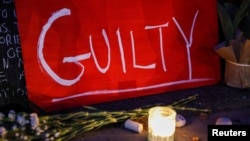Cheers, tears and fear were among reactions in the U.S. to the news that former Minneapolis police officer Derek Chauvin was convicted Tuesday in the death of George Floyd, a Black man, who was prone and handcuffed when he died.
In some neighborhoods and along highways, people held up signs to celebrate the guilty verdicts on three charges in connection to Floyd's death.
Community leaders and activists who say they are fighting to reform policing in the U.S. say Floyd's final moments, captured on phone videos, have galvanized people worldwide about issues of race and law enforcement. The verdict, they say, is a moment to recognize what people have experienced and what needs to be done.
The Rev. Najuma Smith-Pollard, a Los Angeles pastor, said her church and organization are preparing gatherings for after the verdict.
"One of the things that we hope to accomplish is to use this opportunity, to use this moment, to bring community, congregations, residents here in Los Angeles together so we can collectively process our pain," she said. "But also use this moment to talk about where do we go from here?"
After the verdict was announced, President Joseph Biden called Floyd's family. Referring to Vice President Kamala Harris and himself, he said, "We're all so relieved."
Police departments throughout the U.S. braced for gatherings and demonstrations with some residents worried that demonstrations could lead to vandalism and confrontations with police.
Betsy Smith, a spokesperson with the National Police Association, said the push to change policing in the U.S. would ultimately hurt residents.
"The real losers in this case are not going to be American law enforcement," she said. "It's going to be the cities in this country who are going to have to weather these violent demonstrations that we're going to see and it's not just going to be Minneapolis."
Tyler Parry, an assistant professor of African American and African Diaspora Studies at the University of Nevada Las Vegas, said the focus on protests is a diversion from the significance of the conviction and what has become an international movement.
"There's still a sense of loss because George Floyd will not be brought back to life," he said. "But there is at the very least a possibility that the moment can be used for true systemic change."
Some in law enforcement, such as the Oakland Police department in California, used the verdict to acknowledge some of the criticisms of policing in the U.S. The police department called for calm and asked to be contacted if anyone is holding a gathering.
"We all must recognize that this moment is about accountability, justice, and reform. We must be compassionate, empathetic, and forgiving," the Oakland Police department said Tuesday afternoon in an email. "All sides must unite as one community to effectively communicate. Together we will work towards rethinking policing in America."
Elizabeth Lee contributed to this report




